STATE GOVERNMENT
Progress, disappointment from State Legislature
Multiple pro-worker bills approved, but Senate kills HB 1893 to protect strikers. ‘This is not over,’ vows WSLC’s Sims.
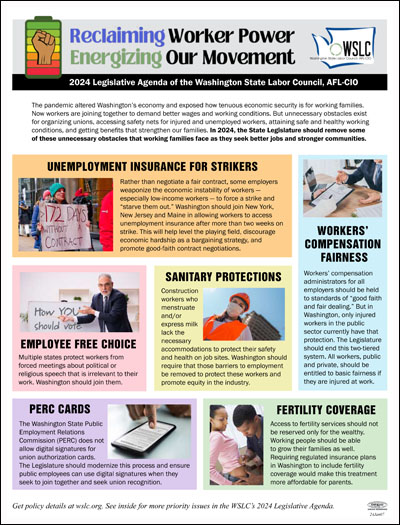 OLYMPIA (March 4, 2024) — Last Friday was the final day for the Washington State Legislature to pass policy bills. Now legislators will focus on passage of a supplemental budget and other fiscal bills before the final day of the session this Thursday, March 7.
OLYMPIA (March 4, 2024) — Last Friday was the final day for the Washington State Legislature to pass policy bills. Now legislators will focus on passage of a supplemental budget and other fiscal bills before the final day of the session this Thursday, March 7.
Much of the news about pro-worker policy legislation was positive, with last week’s passage of bills to protect workers from captive audience meetings, allow digital signatures for public employee organizing, require sanitary conditions on construction sites, and multiple others. However, the Senate declined to take up HB 1893 to allow striking workers access to unemployment insurance benefits, a significant disappointment for Washington’s working families.
“While we were very disappointed that the Senate didn’t vote on HB 1893, we were inspired by the way Washington’s union movement rose up in support of protecting strikers and their families,” said April Sims, President of the Washington State Labor Council, AFL-CIO. “My heartfelt thanks to all the unions that organized and turned out for last week’s labor rally in support of the bill. This is not over. We will continue to fight to level the playing field for Washington workers.”
Below is an update — effective today — on the status of the policy bills listed in the 2024 Legislative Agenda of the Washington State Labor Council, AFL-CIO. (Green titles denote bills that passed and are still alive; red titles are bills that died.) Note that there are additional bills that the WSLC and its affiliates are supporting/opposing that may not be listed in this agenda.
CLIMATE JOBS & JUSTICE
● Siting and Permitting (HB 2039) — Legislators should build on improvements to energy facility siting and permitting processes made in 2022-2023. Local siting and permitting processes should be aligned with the state-level process. — Passed the House 64-33; passed Senate 44-5.
● Buy Clean Buy Fair (HB 1282/SB 5322) — The state spends billions every year on construction materials for public infrastructure, which are often manufactured overseas in countries with poor labor standards and inadequate environmental protections. The state should pilot a program to track the labor and environmental impact of the materials it purchases to build our roads, bridges, and public buildings. — HB 1282 passed the House 58-39; passed Senate 28-20.
● Electrical transmission worker task force (HB 2082) — A study should be conducted to evaluate future needs of the electrical transmission workforce if Washington State is going to meet the needs to increase electrical transmission capacity and achieve our climate goals. — Passed House Postsecondary Education & Workforce; but did not advance from Appropriations.
● School bus electrification (HB 1368/SB 5431) — Protect kids by transitioning Washington’s school buses from asthma-causing diesel to modern, safe electric buses. — HB 1368 passed the House 58-39; passed Senate 29-20.
FAMILY POLICY
● PFML Medical Authorization Fixes (HB 2102/SB 6177) — When workers need Paid Family and Medical Leave to take extended time off to care for themselves or a loved one, long delays in claims approval can occur when healthcare providers do not provide medical certification documentation in a timely manner. By adopting standards for making this documentation available, the Legislature would reduce the potential for additional delays in claims processing for workers who rely on these benefits to make ends meet while they are providing care or recovering themselves. — HB 2102 passed the House 97-0; passed Senate 49-0.
● Wage Replacement for Workers Left Out (HB 1095/SB 5109) — Not every worker qualifies for unemployment insurance. This legislation would take steps to provide a supplemental wage replacement benefit for workers not currently covered due to their immigration status. — Both bills passed policy committees last year, but were not acted upon in 2024 and missed cutoff.
● Expanding Family Definition for Paid Sick Leave (HB 1991/SB 5793) — The Legislature should update the definition of “family member” in our paid sick leave law to accommodate all family compositions, including those who are not bound by blood or marriage. This would align standards for Sick and Safe leave with a recent modernization the Legislature adopted for Paid Family and Medical Leave. — SB 5793 passed the Senate 28-21; passed House 76-19.
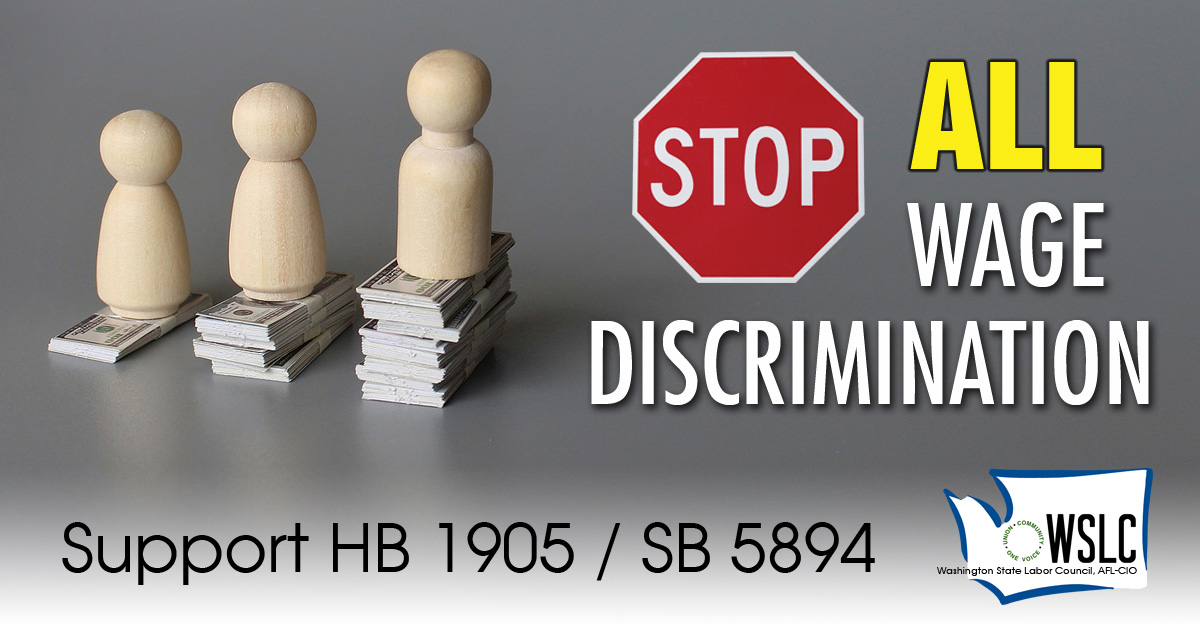
PAY EQUITY
● Prohibiting Discrimination Against Protected Classes (HB 1905/SB 5894) — Washington’s current equal pay statute includes gender. The Legislature should ensure that race and other protected classes are included as well. Workers deserve to be paid fairly for their work, without discrimination on any basis. — HB 1905 passed the House 63-34; passed Senate 36-13.
● OFM Salary Survey Utilization (HB 1774/SB 5694) — In advance of contract negotiations, the Office of Financial Management conducts a salary survey to better understand compensation across like jobs in other states. During bargaining, however, this survey’s use is limited. The Legislature should clarify that this research can be used to inform conversations about compensation. — Passed policy committees last year, but were not acted upon in 2024 and missed cutoff.
WORKER PROTECTIONS
● Unemployment Insurance for Striking Workers (SB 5777/HB 1893) — Rather than negotiate a fair contract, some employers weaponize the economic instability of workers — especially low-income workers — to force a strike and “starve them out.” Washington should join New York, New Jersey and Maine in allowing workers to access unemployment insurance after more than two weeks on strike. HB 1893 / SB 5777 will help level the playing field, discourage economic hardship as a bargaining strategy, and promote good-faith contract negotiations. — HB 1893 passed the House 53-44, but did not get a vote in the Senate.
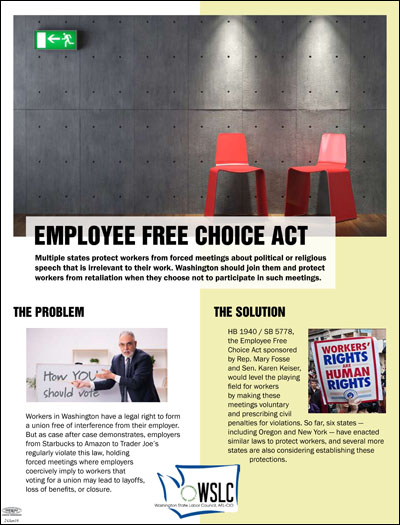 ● Employee Free Choice Act (SB 5778/HB 1940) — Multiple states have created protections against “captive-audience meetings,” which corporations use as a union-busting tactic or to force their political and religious views upon employees. Washington should join them by passing HB 1940/SB 5778. — SB 5778 passed the Senate 28-20; passed the House 55-41.
● Employee Free Choice Act (SB 5778/HB 1940) — Multiple states have created protections against “captive-audience meetings,” which corporations use as a union-busting tactic or to force their political and religious views upon employees. Washington should join them by passing HB 1940/SB 5778. — SB 5778 passed the Senate 28-20; passed the House 55-41.
● Personnel Files (SB 5924) — Workers have a right to access critical information relating to their employment – including wage and benefits documentation. The Legislature should enforce that right. — Passed Senate Labor & Commerce; but did not advance from Ways & Means.
● Joint Legislative Task Force on the Underground Economy in the Construction Industry (SB 6085) — Passed Senate Labor & Commerce; but did not advance from Ways & Means in time for the Feb. 5 cutoff. It could still be resurrected as a budget proviso.
● Grocery worker retention (SB 6007) — A policy to help safeguard the job security and livelihoods of grocery workers when their current employer sells to a new business. This bill protects the safety of food and medicine sold to Washington state families by preventing sudden and mass layoffs of the skilled and licensed employees who are trained and experienced in food and medicine safety when, for example, publicly traded corporations seek to increase profits through proposed mergers. It will protect workers by ensuring that the new owner will retain the existing workforce for a set period of time. — Passed the Senate 32-16; passed House 60-33.
● Mass layoff protections (HB 2100) — For layoffs large enough to require WARN notices, the Legislature should require employers to conduct a survey on demographics of impacted workers and allow a rapid response presentation so workers get information on available benefits like unemployment insurance and healthcare coverage. — Passed House Labor & Workplace Standards; but did not get a House floor vote.
HEALTH & SAFETY
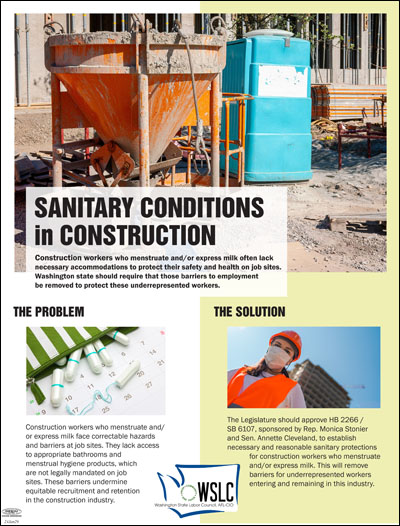 ● Sanitary Conditions for Menstruation and Lactation in Construction (HB 2266/SB 6107) — Construction workers who menstruate and/or express milk lack the necessary accommodations to protect their safety and health on job sites. Washington should pass HB 2266/SB 6107 to remove those barriers to employment, protect these workers, and promote equity in the industry. — HB 2266 passed the House 84-13; passed Senate 49-0.
● Sanitary Conditions for Menstruation and Lactation in Construction (HB 2266/SB 6107) — Construction workers who menstruate and/or express milk lack the necessary accommodations to protect their safety and health on job sites. Washington should pass HB 2266/SB 6107 to remove those barriers to employment, protect these workers, and promote equity in the industry. — HB 2266 passed the House 84-13; passed Senate 49-0.
● Workers’ Comp Fairness (HB 2168/SB 5991) — Workers’ compensation administrators for all employers should be held to standards of “good faith and fair dealing.” But in Washington, only injured workers in the public sector have that protection. Passing HB 2168 / SB 5991 would end this two-tiered system. All workers, public and private, should be entitled to basic fairness if they are injured at work. — Both bills did not advance from policy committee and missed cutoffs.
● Early Time-Loss (HB 1927/SB 5932) — Under current law, an injured worker is denied the first three days of wage replacement benefits until they are off work for at least 14 days. When workers’ are injured on the job, they should be paid for every single day they are unable to work. As a first step toward righting this injustice, the Legislature should reduce the waiting period to seven days only. This will ease the economic burden of being injured, and cause less financial harm to injured workers and their families. — HB 1927 passed the House 60-37; passed Senate 33-16.
● Autonomous Vehicles (SB 5872) — Require a human safety operator. — Did not advance from Senate Labor & Commerce and missed cutoffs.
● Protecting School Bus Drivers on the Job (HB 2133/SB 5891) — Makes trespassing on a bus a crime. A bus driver in the Tri-Cities was tragically killed on the job. This bill tries to ensure only those who belong on school buses get entry. — SB 5891 passed the Senate 46-3, passed House 94-0.
● Crane Safety (HB 2022/SB 5900) — In response to the tragic incident in Seattle in 2019 when a tower crane fell, killing two Ironworkers and two members of the public, the Legislature should address safety by establishing permits for tower crane operation including assembly and disassembly, establish a work zone for traffic closures and public notification when tower cranes will be assembled and disassembled and establish criminal penalties on industries that violate certain safety laws. — HB 2022 passed the House 77-20; passed Senate 48-0.
HEALTH CARE & PUBLIC HEALTH
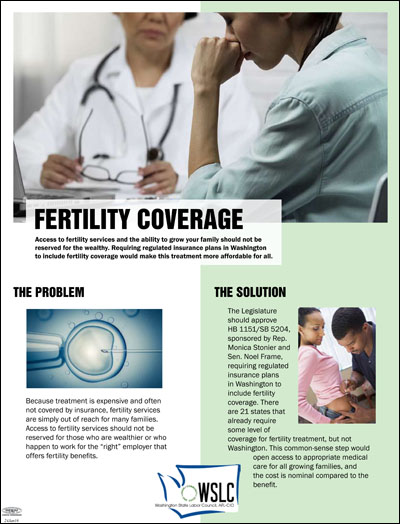 ● Fertility Services Coverage (HB 1151/SB 5204) — Access to fertility services should not be reserved only for the wealthy. Working people should be able to grow their families as well. HB 1151/SB 5204 requires regulated insurance plans in Washington to include fertility coverage so this treatment is more affordable for parents. — Both bills missed cutoff deadlines.
● Fertility Services Coverage (HB 1151/SB 5204) — Access to fertility services should not be reserved only for the wealthy. Working people should be able to grow their families as well. HB 1151/SB 5204 requires regulated insurance plans in Washington to include fertility coverage so this treatment is more affordable for parents. — Both bills missed cutoff deadlines.
● Keep Our Care Act (HB 1263/SB 5241) — Large healthcare systems continue to absorb competitors, which in many cases has reduced patients’ access to important care, including contraception and abortion. The state must pass laws to ensure that these mergers do not restrict access to necessary health care and family planning resources, especially in rural communities where options are limited. — SB 5241 passed the Senate 28-21; but did not get a floor vote in the House.
● Health Care Cost Transparency Board (HB 1508/SB 5519) — HB 1508 passed the House 94-3; passed Senate 45-2.
● School Bus Driver Health Benefits (HB 1248/SB 5873) — School districts contract transportation services to contractors that fail to provide adequate health and pension benefits. The Legislature should ensure contracted bus drivers, who provide the same exact services as school district-employed bus drivers, have comparable benefits. — HB 1248 passed the House 57-39; passed Senate 28-21.
● Essential Workers’ Healthcare Trust (HB 2351) — Many nursing home workers don’t have access to health care. The coverage offered by their employers is extremely expensive and has weak benefits. This is a huge problem for these workers, who face very high rates of on-the-job injury and illness. It also exacerbates the workforce crisis; studies show that strong benefits are the key to retention. Employers can’t provide high-quality benefits because of their small risk pools and inadequate funding. Oregon has addressed this problem through an innovative structure called the Essential Workforce Healthcare Trust. Washington can replicate this model by leveraging state funding and a large risk pool to provide high-quality benefits across the nursing home industry. — HB 2351 did not advance from House Health Care & Wellness and missed cutoff deadlines.
APPRENTICESHIP
● Responsible Bidders in Public Construction (SB 5133) — This legislation would include training agent status as part of responsible bidder criteria to expand apprenticeship opportunities. Did not advance from Senate Ways & Means and missed cutoff deadlines.
COLLECTIVE BARGAINING
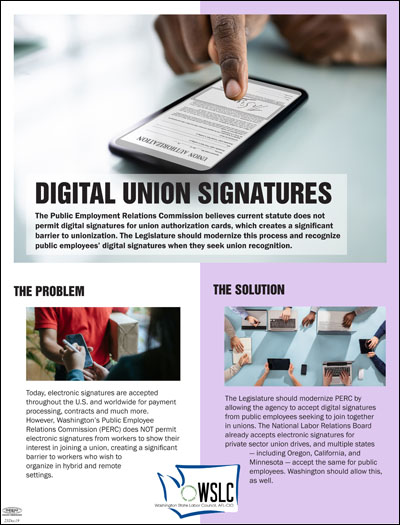 ● PERC Cards: Digital Union Signatures (SB 6060) — The Washington State Public Employment Relations Commission (PERC) does not allow digital signatures for union authorization cards. Approving SB 6060 would modernize this process and ensure public employees can use digital signatures when they seek to join together and seek union recognition. — SB 6060 passed the Senate 31-18; passed House 92-4.
● PERC Cards: Digital Union Signatures (SB 6060) — The Washington State Public Employment Relations Commission (PERC) does not allow digital signatures for union authorization cards. Approving SB 6060 would modernize this process and ensure public employees can use digital signatures when they seek to join together and seek union recognition. — SB 6060 passed the Senate 31-18; passed House 92-4.
● Legislative Staff Collective Bargaining (HB 2325/SB 6194) — In 2022, the Legislature passed a law removing the prohibition for certain legislative staff for collective bargaining. A new bill seeks to clarify bargaining units and what can and cannot be bargained and by whom. — SB 6194 passed the Senate 27-22; passed House 56-37.
● WFSE Interpreters/Procurement (SB 5810) — Passed Senate Labor & Commerce; but did not advance from Ways & Means so it missed cutoff.
● Interest Arbitration for Public Safety Telecommunicators (SB 5808) — Passed the Senate 48-0; passed House 92-0.
● Interest Arbitration for Residents and Fellows (HB 1307) — Passed policy committee last year, but was not acted upon in 2024 and missed cutoff.
LABOR VOICE
● Voting Rights for Labor Representatives (HB 1219/SB 5575) — Public Transportation Benefit Area governing boards have included a non-voting labor representative for many years. This bill would simply turn the non-voting PTBA labor representative position into a full voting member to give them a legitimate voice, while maintaining the exclusion from executive sessions when discussing negotiations with labor organizations. — Passed policy committees last year, but were not acted upon in 2024 and missed cutoff.
RETIREMENT
● Plan 1 COLA (HB 1985) — Plan 1 (PERS 1 and TRS 1) retirees no longer receive automatic COLAs. To prevent retirees on fixed incomes from losing additional purchasing power, the Legislature needs to provide a benefit increase in 2024. This action will keep retired public workers in their homes and able to afford health care and food. — Passed the House 97-0; passed Senate 49-0.
● Increase state support for PEBB retiree health insurance (HB 2188/SB 6139) — Retired public workers are being priced out of PEBB health insurance plans. The state currently subsidizes 50% of PEBB retiree health insurance premiums, capped at $183 per month. The $183 cap, which was set in 2009, needs to be eliminated or increased to keep up with skyrocketing health care costs. — Both bills did not advance from policy committees and missed cutoff.





